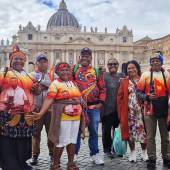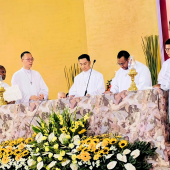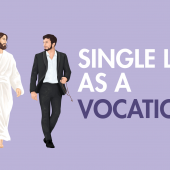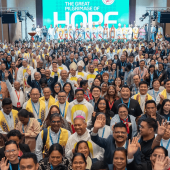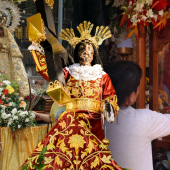Papua New Guinea marks historic first in conclave participation

In a monumental moment for Papua New Guinea (PNG), history will be made as Cardinal Sir John Ribal MSC prepares to take part in the next conclave starting May 7, 2025—a secretive process by which the Catholic Church elects a new pope. The date marks the first time in history that a Papua New Guinean will cast a vote to help determine the spiritual leader of over 1.4 billion Catholics worldwide.
As the world’s eyes turn toward the Vatican, a small but fervently Catholic nation in the South Pacific celebrates a milestone that places it directly within the sacred corridors of global Catholicism.
A Nation’s Son Among the Cardinals
Ribat, the Archbishop of Port Moresby, is no stranger to the global stage. Appointed cardinal by Pope Francis in 2016, he became the first and only cardinal in the history of Papua New Guinea. His elevation was more than symbolic; it was a recognition of the growing significance of the Church in Oceania, particularly in PNG, a country where Catholicism continues to play a vital spiritual, educational, and social role.
Now, nearly a decade later, Ribat stands on the threshold of another historic moment: taking his place in the Sistine Chapel alongside 132 other cardinals to elect the next successor of St. Peter.
"This is not just my responsibility," Ribat said in a statement from Rome. "I carry with me the prayers, hopes, and faith of my people—the faithful of Papua New Guinea and the Pacific. It is a sacred duty and an incredible honor."
The Conclave: Ancient Ritual Meets Modern Significance
The conclave is one of the oldest ongoing traditions in the Catholic Church, dating back to the 13th century. Held in the Sistine Chapel of the Apostolic Palace in the Vatican, the conclave is an enclosed gathering of cardinals under the age of 80 tasked with electing a new pope following a papal resignation or death.
The cardinals—“Princes of the Church”—enter the conclave in complete seclusion. Cut off from the outside world, they participate in daily voting rounds until one candidate receives a two-thirds majority.
This sacred rite is not only deeply spiritual but also rich in symbolism. The image of white smoke rising from the chapel chimney signals that a new pope has been chosen.
This time, a voice from Papua New Guinea will help shape that decision.
An Emerging Voice from the Pacific Islands
Ribat’s inclusion in the conclave carries symbolic and practical significance for the Catholic Church in the Pacific region. For centuries, the highest decision-making roles in the Church have predominantly been held by Europeans and Latin Americans. Ribat's participation brings visibility to a part of the world that is often underrepresented in global religious discourse.
“His involvement means that the needs, voices, and perspectives of Pacific Island Catholics are heard in one of the most important decisions in the Church,” said Malipin Angalean Philip Kyakao, a senior member of Catholic Laity organization the Bishop Herman Raich SVD Foundation Inc. "Issues like climate change, poverty, and indigenous spirituality—all of which are pressing in the Pacific—can now be brought into the global conversation.”
With a Catholic population in PNG estimated at around 2 million, or roughly 27% of the country, the Church has been instrumental in education, health services, and peace-building efforts. Catholic-run schools and health clinics are spread across PNG’s vast and often rugged terrain, reaching even the most remote communities.
The Journey of Cardinal John Ribat
Born on February 9, 1957, in Volavolo, East New Britain Province, Ribat entered religious life with the Missionaries of the Sacred Heart (MSC). Ordained as a priest in 1985, he served in pastoral and administrative roles before being appointed Bishop of Berina, Central Province, in 2000 and then Archbishop of Port Moresby in 2008.
In 2016, the late Pope Francis elevated him to the College of Cardinals, a move that surprised many but delighted the PNG faithful. Known for his humility, environmental advocacy, and pastoral heart, Ribat has spoken frequently about social justice, indigenous rights, and the climate crisis.
His participation in international forums like the Synod of the Bishop for the Pan-Amazon Region and his support for Laudato Si’, Francis’ encyclical on ecology, made him an important voice on global issues affecting small island nations.
“Climate change is not a theory for us; it’s reality,” Ribat once said. “We in the Pacific are living its effects. Rising seas are threatening our homes and livelihoods. The Church must speak for creation and for those whose voices are often ignored.”
Faithful Celebrations Back Home
In PNG, news of Ribat’s participation in the conclave has sparked joyful celebrations across dioceses. Special Masses, prayer vigils, and processions have been held in Port Moresby, Lae, Mt. Hagen, and other cities and rural communities.
In Volavolo, his home village, parishioners gathered to pray the Rosary and offered thanksgiving for the historic moment.
“Never in our wildest dreams did we think someone from here would one day help choose a pope,” said Maria Baris, an elder in the community. “We thank God. We feel proud and humble.”
The Papua New Guinea Movement of Catholic Student Groups has also responded with enthusiasm, sharing messages of encouragement across social media, posting images of Cardinal Ribat alongside papal quotes, and organizing prayer gatherings for guidance during the conclave.
What This Means for PNG and Oceania
While the conclave is first and foremost a spiritual event, the presence of Ribat carries geopolitical and cultural significance.
“The Pacific is now on the map in a unique way,” said Professor Helen of Deakin University. “For decades, we've been seen as peripheral. This moment reaffirms that our region is not forgotten by the global Church.”
It is also an affirmation of Francis' ongoing mission to decentralize the Church and make it more inclusive of the "global south." By appointing cardinals from regions like PNG, Myanmar, Singapore, East Timor, and Congo, the pope has intentionally broadened the cultural and pastoral experience of the College of Cardinals.
Ribat’s participation could also lead to increased resources and attention for the Church in PNG, particularly in areas like clergy training, social justice advocacy, and ecological preservation.
Inside the Conclave: What Awaits Cardinal Ribat
Once inside the conclave, Ribat—like his fellow electors—will take an oath of secrecy and prayerfully discern who among them is best suited to lead the Church in the 21st century. Key qualities often sought in a pope include pastoral wisdom, theological soundness, global vision, and an ability to engage with the modern world.
While no one can predict who will be chosen, speculation often surrounds cardinals with large followings, experience in the Curia (Vatican administration), or influential global roles.
Ribat himself is not considered a likely papal candidate, but his vote and voice in the deliberations represent the deepening diversity of the Church. It is possible, however, that his insight on climate issues and grassroots faith could influence who ultimately emerges as the next pontiff.
A Moment of Unity and Global Catholicism
As the bells of St. Peter’s Basilica prepare to ring again, Papua New Guinea’s role in this global spiritual event offers a powerful image of the universal church—a church that is no longer centered solely in Europe, but one that embraces its many voices across continents and oceans.
Whether in Rome or Rabaul, Vatican City or Yampu, Par or Wabag, the faith that unites Catholics is alive, diverse, and increasingly inclusive.
The Future Beyond the Conclave
Regardless of who is elected Pope, the participation of Ribat has already opened a new chapter in PNG’s religious identity. It affirms the maturity of the local Church and underscores the commitment of PNG Catholics to global Catholicism.
The event also serves as an inspiration for younger generations. Many seminarians and religious aspirants see in Cardinal Ribat a living example that faithfulness and humility can lead to leadership at the highest levels.
“For me, it’s a call to serve even more,” said Yorkson Mathius, a former seminarian at Holy Spirit Seminary in Bomana. “Seeing someone from our land in the conclave reminds us that holiness is possible here, too.”
Conclusion: A Small Nation, A Great Witness
For Papua New Guinea, the participation of Cardinal John Ribat in the conclave is more than a historical footnote—it is a testament to the enduring and growing presence of the Church in the Pacific. It signals that voices from the islands, from the rainforest communities, and from villages accessible only by foot or canoe now echo within the Sistine Chapel.
As the faithful await the white smoke that will signal a new pope, one thing is already clear: PNG is no longer merely a receiver of mission; it is now a full participant in the mission of the Church.
And through Ribat, it walks side by side with the rest of the Catholic world—a tiny island nation offering a powerful witness. - Martin Korokan Lomeyari
Radio Veritas Asia (RVA), a media platform of the Catholic Church, aims to share Christ. RVA started in 1969 as a continental Catholic radio station to serve Asian countries in their respective local language, thus earning the tag “the Voice of Asian Christianity.” Responding to the emerging context, RVA embraced media platforms to connect with the global Asian audience via its 21 language websites and various social media platforms.









